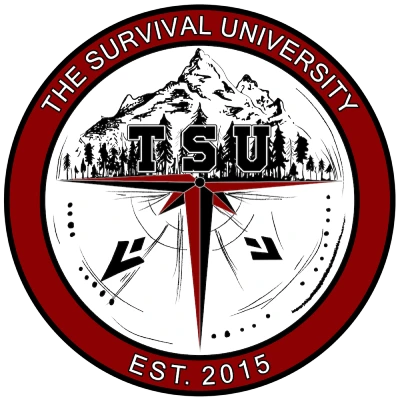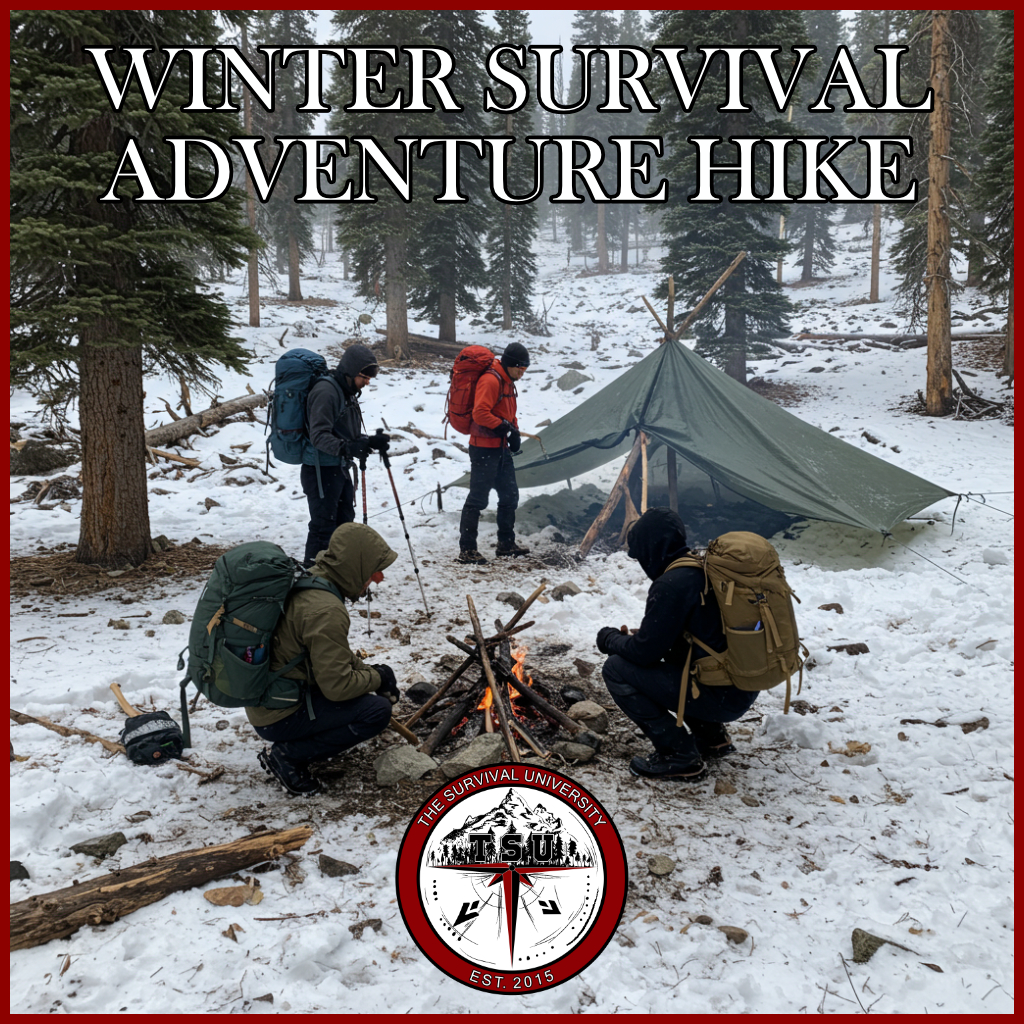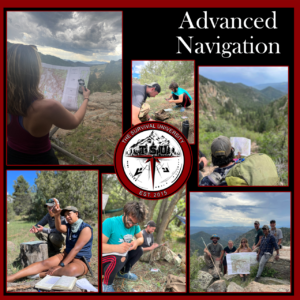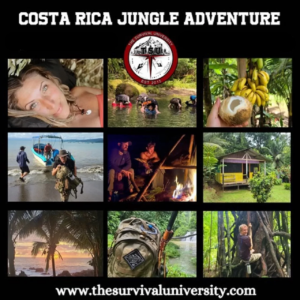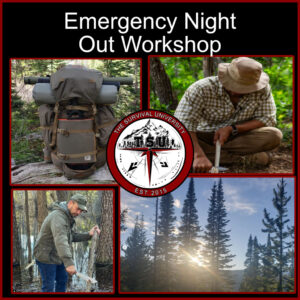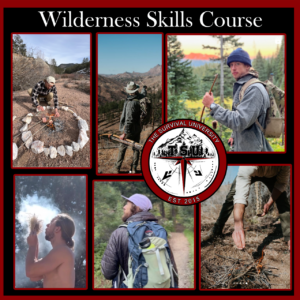Cart
Advanced Winter Survival Hike – Colorado Backcountry Survival Training
$495.00
Push your limits in this 3-day Winter Survival Adventure Hike through Colorado’s unforgiving backcountry. No trails, no shortcuts—just snow, sweat, and survival. Refine cold-weather skills, build fires, create shelter, and face real winter conditions head-on.
Description
Winter Survival Adventure Hike – Colorado Backcountry Survival Training
Colorado’s winter backcountry is as unforgiving as it is beautiful. For those who have completed our Basic Winter Survival Class, this 3-day Winter Survival Adventure Hike is your next challenge. This immersive cold-weather experience pushes you beyond the classroom and deep into the raw wilderness—off-trail, off-grid, and face-to-face with the brutal reality of winter survival.
This is not a casual winter hike. We’ll cover approximately 9 miles of rugged terrain over three days, including snow-covered slopes, thick timber, old game trails, and remote sections of wild, frozen landscape. You’ll be carrying your gear, managing your body heat, and applying survival knowledge in real-time under real stress. There are no shortcuts, no groomed paths—only experience earned the hard way.
Course Overview
This advanced winter adventure is designed to test your physical resilience and expand your survival skill set. While training is built into the experience, the focus is on applying what you’ve already learned under pressure, in unpredictable conditions. You’ll build fires when everything is frozen, set up shelter with limited resources, and learn how to endure freezing nights with nothing but what you carry on your back and what nature provides.
What to Expect
Expect snow. Expect sweat. Expect discomfort, problem-solving, and deep cold. Over the course of this 3-day trek, you’ll refine practical skills while pushing your limits in backcountry terrain that doesn’t care if you succeed or fail. This course is equal parts winter survival training and mental toughness challenge.
Skills Taught and Refined
-
Advanced shelter-building techniques using natural materials
-
Cold-weather firecraft with minimal resources
-
Snow assessment and terrain awareness for safety
-
Winter foraging and sustainable resource use
-
Gear management for multi-day exposure
-
Emergency fieldcraft: dealing with injuries, cold stress, and changing weather
-
Real-time application of both primitive and modern winter survival skills
What You’ll Walk Away With
-
Sharpened winter survival instincts through real-world practice
-
Confidence in your ability to stay alive in the wild during winter conditions
-
A deeper understanding of how to move, live, and endure in freezing backcountry environments
-
A hard-earned experience that few others will ever attempt
Prerequisites This course is open to those who have completed our Basic Winter Survival Class or have equivalent field experience. It is physically and mentally demanding. A high level of fitness, cold-weather readiness, and mental grit is required.
ACCOMMODATIONS
If students do not wish to camp with us, the town of Cripple Creek is a short 15 minute drive from our location and Woodland Park is 30 minutes away. Students will be responsible for making their own reservations with nearby hotels. We do have a central community campfire location with a few designated campsites but mostly offer dispersed camping. Students will be able to drive their car within 100 feet of the main camp and will not have to hike gear in for long distances.
- Sanitation/Hygiene: A portable restroom and potable water will be provided at main camp.
FOOD AND WATER REQUIRED
Water will be provided but students will need to bring their own food. We recommend quick field expedient meals such as freeze dried hiking meals or MRE’s. They can quickly be made at our primitive camps and won’t slow down the learning process. However, students may bring any food that they wish to cook over the campfire or on their own personal camp stove.
Food can be purchased locally at nearby facilities. Walmart and several local eateries are within a reasonable driving distance.
Due to the different levels of prior experience and knowledge among students in each class, individual outcomes may vary. Weather conditions can also be a factor in changing class content slightly. Nonetheless, our instructors will always endeavor to be as accommodating and consistent as circumstances will allow to ensure students get the best training experience and value for money.
Start Time: 10:00AM (check-in begins at 9:00am)
End Time: 5:00PM
LENGTH
3 days/2 nights
ACCOMMODATIONS
If students do not wish to camp with us, the town of Cripple Creek is a short 15 minute drive from our location and Woodland Park is 30 minutes away. Students will be responsible for making their own reservations with nearby hotels. We do have a central community campfire location with a few designated campsites but mostly offer dispersed camping. Students will be able to drive their car within 100 feet of the main camp and will not have to hike gear in for long distances.
- Sanitation/Hygiene: A portable restroom and potable water will be provided at main camp.
FOOD AND WATER REQUIRED
Water will be provided but students will need to bring their own food. We recommend quick field expedient meals such as freeze dried hiking meals or MRE’s. They can quickly be made at our primitive camps and won’t slow down the learning process. However, students may bring any food that they wish to cook over the campfire or on their own personal camp stove.
Food can be purchased locally at nearby facilities. Walmart and several local eateries are within a reasonable driving distance.
SUGGESTED GEAR LIST
We do not provide students with gear unless they have purchased it from us ahead of time. Not much gear is needed for our courses, though good equipment does speed the learning process up greatly! Gear does not have to be purchased from our store to attend the course, but we recommend survival gear of equivalent quality.
-
Required Gear
Clothing (Layered System):
-
Base layers (synthetic or merino wool — top & bottom)
-
Mid-layer fleece or wool sweater
-
Insulated jacket (down or synthetic)
-
Waterproof/breathable shell (jacket & pants)
-
Insulated winter pants or over-pants
-
Wool or synthetic hat (that covers ears)
-
Neck gaiter or balaclava
-
Gloves (2 pairs: 1 insulated + 1 waterproof outer shell)
-
Wool or synthetic socks (minimum 3 pairs)
-
Gaiters (for snow protection)
-
Insulated, waterproof boots (rated for sub-zero temps)
Shelter & Sleep:
-
Tarp with guy lines (min 8×10, ripstop preferred)
-
Wool blanket or bivy sack
-
Closed-cell foam sleeping pad (full-length)
-
Optional: lightweight sleeping bag (NO tents or hammocks allowed)
Fire & Cooking:
-
Ferro rod
-
Lighter (Bic or stormproof)
-
Cotton balls + wax or other tinder
-
Small metal cook pot or canteen cup
-
Stainless steel water bottle or metal canteen (single-walled)
-
Small stove or alcohol burner (optional—fire use preferred)
Tools:
-
Fixed blade knife (full tang)
-
Folding saw
-
Compact axe or hatchet (optional but helpful)
-
Headlamp with extra batteries
Personal Gear:
-
Backpack (large enough to carry all gear comfortably)
-
Dry bags or contractor trash bags (to keep gear dry)
-
Personal first aid kit
-
Personal hygiene items (toothbrush, TP in ziplock, etc.)
-
Chapstick, sunscreen, and sunglasses (snow glare is real)
-
Trail snacks and meals for 3 days (plan for high-calorie, no-cook options)
-
Small notebook and pencil/pen
Optional but Recommended:
-
Hand warmers
-
Trekking poles
-
Lightweight insulated sit pad
-
Small sharpening stone or strop
Important Notes:
-
No cotton clothing. It kills in the cold.
-
Bring what you can carry. You’ll be moving and working.
-
Expect snow, wind, wet, and cold. Train for discomfort, not luxury.
-
You may also like…
-
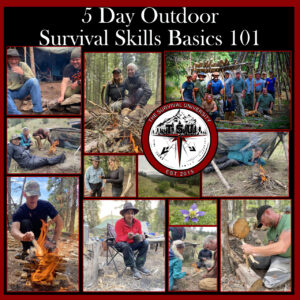
5 DAY OUTDOOR SURVIVAL BASICS 101
$595.00-
Select options This product has multiple variants. The options may be chosen on the product page
